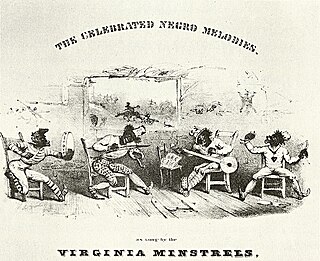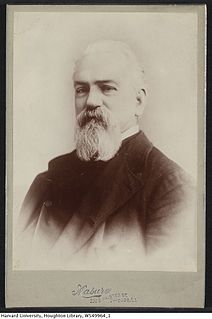Related Research Articles

The minstrel show, or minstrelsy, was an American form of entertainment developed in the early 19th century. Each show consisted of comic skits, variety acts, dancing, and music performances that depicted people specifically of African descent. The shows were performed by mostly white people in make-up or blackface for the purpose of playing the role of black people. There were also some African-American performers and black only minstrel groups that formed and toured. Minstrel shows lampooned black people as dim-witted, lazy, buffoonish, superstitious, and happy-go-lucky.

The Virginia Minstrels or Virginia Serenaders was a group of 19th-century American entertainers who helped invent the entertainment form known as the minstrel show. Led by Dan Emmett, the original lineup consisted of Emmett, Billy Whitlock, Dick Pelham, and Frank Brower.

Daniel Decatur Emmett was an American songwriter, entertainer, and founder of the first troupe of the blackface minstrel tradition, the Virginia Minstrels. He is most remembered as the creator of the song "Dixie".

"Dixie", also known as "Dixie's Land", "I Wish I Was in Dixie", and other titles, is a song that has been popular in the Southern United States since the 19th century. It is one of the most distinctively Southern musical products of the 19th century and probably the best-known song to have come out of blackface minstrelsy. It was not a folk song at its creation, but it has since entered the American folk vernacular. The song likely cemented the word "Dixie" in the American vocabulary as a nickname for the Southern U.S.

"Old Dan Tucker", also known as "Ole Dan Tucker", "Dan Tucker", and other variants, is an American popular song. Its origins remain obscure; the tune may have come from oral tradition, and the words may have been written by songwriter and performer Dan Emmett. The blackface troupe the Virginia Minstrels popularized "Old Dan Tucker" in 1843, and it quickly became a minstrel hit, behind only "Miss Lucy Long" and "Mary Blane" in popularity during the antebellum period. "Old Dan Tucker" entered the folk vernacular around the same time. Today it is a bluegrass and country music standard. It is no. 390 in the Roud Folk Song Index.
Bryant's Minstrels was a blackface minstrel troupe that performed in the mid-19th century, primarily in New York City. The troupe was led by the O'Neill brothers from upstate New York, who took the stage name Bryant.
"I'm Going Home to Dixie" is an American walkaround, a type of dance song. It was written by Dan Emmett in 1861 as a sequel to the immensely popular walkaround "Dixie". The sheet music was first published that same year by Firth, Pond & Company in an arrangement by C. S. Grafully. Despite the publisher's claim that "I'm Going Home to Dixie" had been "Sung with tumultuous applause by the popular Bryant's Minstrels", the song lacked the charm of its predecessor, and it quickly faded into obscurity. The song's lyrics follow the minstrel show scenario of the freed slave longing to return to his master in the South; it was the last time Emmett would use the term "Dixie" in a song. Its tune simply repeated Emmett's earlier walkaround "I Ain't Got Time to Tarry" from 1858.

"Sich a Getting Up Stairs" is an American song that dates to the early 1830s. It was in the repertoire of Thomas D. Rice and other early blackface performers.
"Clare de Kitchen" is an American song from the blackface minstrel tradition. It dates to 1832, when blackface performers such as George Nichols, Thomas D. Rice, and George Washington Dixon began to sing it. These performers and American writers such as T. Allston Brown traced the song's origins to black riverboatsmen. "Clare de Kitchen" became very popular, and performers sometimes sang the lyrics of "Blue Tail Fly" to its tune.
"De Wild Goose-Nation" is an American song composed by blackface minstrel performer Dan Emmett.
"Johnny Roach" is an American song written by blackface minstrel composer Dan Emmett. The song was first published in 1859. The lyrics tell of a slave who has escaped to the Northern United States. He laments his lost plantation house and realizes that he really belongs in the South:
"I'm Gwine ober de Mountain", also spelled "I'm Going ober de Mountain", is an American song written by the blackface minstrel composer Dan Emmett. The song may be a precursor to "Dixie", as evidenced by its line "Away down south in de Kentuck brake"; in comparison, "Dixie" includes the line, "Away down south in Dixie". The first phrase of "I'm Gwine ober de Mountain" was probably modeled after "The Spinning Wheel", an older English song.

Richard Ward "Dick" Pelham, born Richard Ward Pell, was an American blackface performer. He was born in New York City.

William M. Whitlock (1813–1878) was an American blackface performer. He began his career in entertainment doing blackface banjo routines in circuses and dime shows, and by 1843, he was well known in New York City. He is best known for his role in forming the original minstrel show troupe, the Virginia Minstrels.
"Miss Lucy Long", also known as "Lucy Long" as well as by other variants, is an American song that was popularized in the blackface minstrel show.

Francis Marion Brower was an American blackface performer active in the mid-19th century. Brower began performing blackface song-and-dance acts in circuses and variety shows when he was 13. He eventually introduced the bones to his act, helping to popularize it as a blackface instrument. Brower teamed with various other performers, forming his longest association with banjoist Dan Emmett beginning in 1841. Brower earned a reputation as a gifted dancer. In 1842, Brower and Emmett moved to New York City. They were out of work by January 1843, when they teamed up with Billy Whitlock and Richard Pelham to form the Virginia Minstrels. The group was the first to perform a full minstrel show as a complete evening's entertainment. Brower pioneered the role of the endman.

Africa is an unincorporated community located in Orange Township of southern Delaware County, Ohio, United States, by Alum Creek.
Land of Freedom may refer to:

John Hodges was an early blackface minstrel entertainer, who wrote or popularized the song "Buffalo Gals", published by him in 1844 under the title 'Lubly Fan'. There is some dispute as to whether he composed the tune or adapted a traditional air.
References
- Nathan, Hans (1962). Dan Emmett and the Rise of Early Negro Minstrelsy. Norman: University of Oklahoma Press.